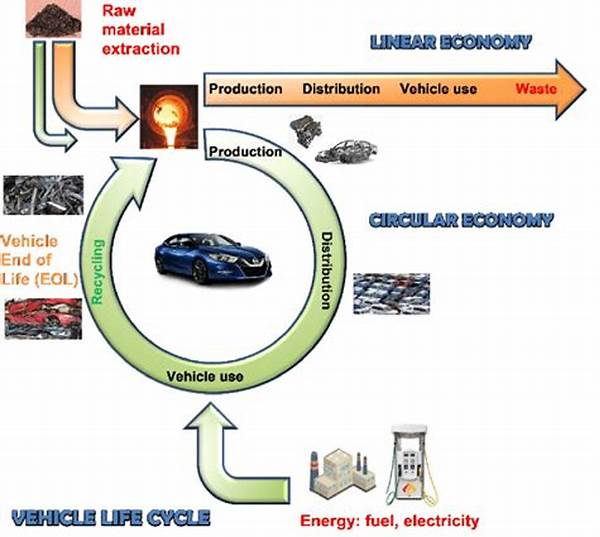
Efficient Vehicle Lifecycle Processes
In today’s highly competitive automotive industry, finding ways to enhance productivity and reduce costs is paramount. Efficient vehicle lifecycle processes can significantly contribute to optimizing resources, improving product quality, and ensuring sustainable growth. By streamlining each phase of the vehicle lifecycle, from design and manufacturing to end-of-life management, businesses can unlock new efficiencies and drive profitability. It’s not just a matter of keeping up with industry standards; embracing efficient vehicle lifecycle processes is crucial to staying ahead.
Read Now : Experienced Automotive Repair Technicians [city]
Understanding the Importance of Efficient Vehicle Lifecycle Processes
The vehicle lifecycle encompasses several stages, each presenting unique challenges and opportunities for improvement. By implementing efficient vehicle lifecycle processes, automotive businesses can gain a competitive advantage in a multitude of ways. Firstly, they enable faster time-to-market by streamlining the design and development phases. This acceleration not only meets consumer demand quicker but also reduces costs associated with prolonged development cycles. Furthermore, efficient processes improve communication and collaboration among departments, leading to fewer errors and higher-quality outputs.
Moreover, these processes play a critical role in regulatory compliance and environmental responsibility. Efficient vehicle lifecycle processes integrate sustainable practices, ensuring that each stage minimizes waste and emissions. Companies adopting these practices not only align with environmental regulations but also enhance their brand reputation as socially responsible enterprises. In conclusion, understanding and implementing efficient vehicle lifecycle processes is not merely an operational enhancement—it’s a strategic necessity for modern automotive companies striving for excellence.
Key Elements of Efficient Vehicle Lifecycle Processes
1. Design Optimization: Streamlined design processes reduce time and cost, enhancing efficiency.
2. Manufacturing Excellence: Incorporating automation and lean methods boosts production efficiency.
3. Supply Chain Integration: Seamless collaboration with suppliers ensures timely and cost-effective material flow.
4. Quality Assurance: Rigorous testing protocols ensure product reliability and customer satisfaction.
5. Sustainability Initiatives: Eco-friendly practices throughout the lifecycle reduce environmental impact.
The Role of Technology in Efficient Vehicle Lifecycle Processes
Incorporating advanced technology is pivotal for efficient vehicle lifecycle processes. Digital tools, such as PLM (Product Lifecycle Management) software, revolutionize how companies manage different lifecycle stages. These technologies enhance data integration and visibility, facilitating better decision-making. With real-time data at their fingertips, companies can quickly adapt to market changes and customer preferences, setting the pace in the competitive automotive arena. Furthermore, technology fosters innovation, allowing companies to explore new materials and techniques. As a result, efficient vehicle lifecycle processes become a reality, providing significant returns on investment.
Automation, another technological cornerstone, cannot be overlooked. When seamlessly integrated into production lines, it minimizes manual errors, reduces workloads, and accelerates output without compromising quality. Robotics and AI-driven tools empower workers to focus on complex tasks rather than repetitive ones, maximizing human potential. As the automotive industry continues to evolve, staying updated with technological advancements is essential. Through cutting-edge technology, businesses can achieve efficient vehicle lifecycle processes, securing their place as industry leaders.
Read Now : Carbon Footprint Reduction In Tires
Benefits of Implementing Efficient Vehicle Lifecycle Processes
Implementing efficient vehicle lifecycle processes can transform the trajectory of an automotive business. It provides a robust foundation for cost reduction by eliminating inefficiencies and waste. Additionally, these processes foster innovation by allowing teams the freedom to focus on groundbreaking ideas rather than troubleshooting inefficiencies.
Furthermore, the customer experience is greatly enhanced. Streamlined operations ensure that vehicles meet high-quality standards and are delivered promptly. This reliability increases consumer trust and brand loyalty, driving repeat business and positive word-of-mouth. In an industry where detail-oriented and timely production can set a brand apart, efficient vehicle lifecycle processes are not just beneficial—they are indispensable for maintaining competitiveness.
Ensuring Longevity with Efficient Vehicle Lifecycle Processes
Achieving efficient vehicle lifecycle processes is about more than short-term gains. It’s about crafting a sustainable model that guarantees long-term success. Companies that consistently invest in refining these processes position themselves as industry forerunners. They achieve better risk management, predict and mitigate potential challenges, and adapt swiftly to market demands.
Moreover, these enterprises are better equipped to innovate, exploring new technologies and methodologies without fear of significant disruption. In an era where agility and resilience define success, businesses that prioritize efficient vehicle lifecycle processes ensure their ability to thrive amidst rapid industry changes. It’s about establishing a legacy of excellence and innovation that can withstand the test of time.
Leveraging Efficient Vehicle Lifecycle Processes for Market Growth
By capitalizing on efficient vehicle lifecycle processes, automotive companies can expand their market reach and build a solid foundation for future expansion. Efficient processes cut costs and increase the speed of production, allowing for competitive pricing and adaptability to consumer demands.
In addition, well-managed processes minimize resource waste and optimize production schedules, translating directly into enhanced profit margins. They also empower companies to explore new markets with innovative products that align with emerging trends. In sum, efficient vehicle lifecycle processes are not just about improving current operations but are a strategic pathway to sustained market growth and leadership.